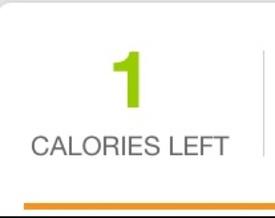eat back my exercise calories?

MrsObundles
Posts: 138 Member
I normally burn around 600 calories/day. Does this mean I should eat an extra 600 calories to prevent going into starvation mode, or should I just eat the original recommended amount? What does everyone think?
0
Replies
-
I'm curious about this too-- I try to always eat 1200 calories (my bmr) but then also do cardio that burns 650/calories a day... i'm nervous about undereating and sabatoging my goal of healthy weight loss!0
-
I eat mine.0
-
My nutritionist told me not to eat back the cals lost during weight training. It all depends on your goal really. If you want to lose weight, then don't. However, if you want to mantain your current weight, then I beleive you need to eat more then 1200 cal per day if you train like this.0
-
Most people say eat about 1/2 of your exercise cals. It sounds about right...you do need to eat more.0
-
I am not sure of the true answer to this question. I have heard answers on both sides of the argument. The truth is that you are just going to have to find what works for you and your body. I personally don't eat my exercise calories as burning those calories was the whole point of my exercise. Why eat the ones I am trying to burn?0
-
I eat almost all of my exercise calories and have had pretty great success thus far. I am confident that it's safe to eat them b/c I get my calorie burn numbers from a heartrate monitor with a chest strap (most accurate) which allows me to program in my height/weight/age. If I were taking the estimates from MFP or gym machines, I'd be afraid to eat them all since many people have noted that those estimates can frequent fly be far off from reality.0
-
I haven't been here long, but there seems to be 2 thoughts on is. The prevalent idea is that it's ok to eat back the calories burned. There are a few that don't think you should.
Personally, I've adjusted my calorie formula to give me a large enough calorie intake, but a proportionally higher exercise rate to achieve the same deficiency.
At the end of the day, its about deficiency. For a lot of us, eating into the exercise calories cuts into the deficiency too. Kinda defeats the purpose.0 -
If you're here on MFP the system is designed so you get a calorie goal to lose your goal weight before lifting a finger in exercise.
Exercising burns calories widening your deficit to possibly unsafe levels so the system has you eat them back.
What MY nutritionist/ dietitian (was a program with multiple levels of contact) did was give me a calorie goal (higher than MFP's as it turns out) and an exercise goal. In the end the result was the same. higher initial calorie goal, but expected to work out to create my deficit. Or here on MFP a lower calorie goal to begin with and WHEN I exercise I get to eat more calories. Which works much better for me as I certainly don't exercise daily.0 -
Okay, I see lots of people doing this. Technically it should still work IF the calories you thought you burned were accurate and IF the metabolism rate you were calculating is correct. (sedentary vs active) which can be a 300 calorie difference! I see people here counting calories that they normally would have burned in an average day from doing normal activities, I would NOT count those back. These types of activities are factored into your metabolism already. I would only dare to eat back calories from excercise I would not normally have done outside of a diet. If you walk your pooch every day on a normal basis before your diet and you were still overweight, what makes you think you can eat back those calories now and still lose weight? Let's not fool ourselves into failure. However if you take an extra long walk then I would count that. And don't forget to add calories back for your poor pooch too
 ! 0
! 0 -
MFP builds in your deficit from caloric intake when you set your goals. If you choose to lose at x amount per week, your target caloric intake will be set to create a deficit of the amount required to help you reach that each day. Example, if you wanted to lose a pound a week, your daily calorie deficit, built in, would be 500.
When you don't eat back your exercise calories, you are adding an additional deficit to what you already set. If you wanted to lose half a pound through diet, you could eat back all of your exercise calories except 250 daily to lose another half pound through exercise.
This is in an ideal, simplified world. Our bodies are very individual, and this might take some tweaking. I eat all of my exercise calories because I know I'll be burning post workout anyway and the food deficit is enough for me.
Really up to you and what you want to do. Hope this was helpful.0 -
For me, because I've set myself up for a slow loss - aiming for 1 pound a week, I don't eat back all my exercise cals.
I think if you don't eat them back but you've got MFP set up to give you a calorie amount to lose the maximum per week, then you can end up messing your body up - starvation mode etc etc.
It seems to be working for me so far, but I'm willing to try different techniques if I stall!0 -
-
It's up to you - if you eat them back you still have a calorie deficit (as calculated by MFP) so you will lose weight. Of courese, this assumes you are logging your food and exercise accurately and staying under your daily NET calorie goal (ie daily allowance plus exercise cals).
If you don't eat them back you are making that calorie deficit much larger.
Your body might respond well to this and you could lose more weight.
Or, your body might not be getting enough nutrition to support the amount of activity you are doing and it could slow down to conserve energy. This can lead to weight loss slowing down or stalling.
The only way is to try it out and see, although from reading lots of posts on this topic it seems that people who have more weight to lose can cope better with a large calorie deficit. If you are closer to your healthy weight range, the big deficit might not work for you.
Personally, I've always eaten them back, because if I can lose weight anyway while eating them - why would I deprive myself unneccesarily?
Sure, it might mean that it takes a little longer to lose all the weight I want - but I'm not in this for a competition, I'm serious about getting healthier and staying that way. Cutting calories dramatically is just never going to be sustainable for me, whereas having a more moderate deficit (which means eating my exercise cals) has been pretty easy to sustain and I've had real success - look at my pics to see the difference from January to November!0 -
There are valid arguments for and against eating your workout burn calories, but at the end of the day it is all about maintaining a balance that lets you achieve caloric deficit while still managing good nutrition with regular meals. If you eat regularly and keep your metabolism going, and if you feel that your daily intake is sufficient and that you can maintain it, then great! Not eating those calories will make your deficit larger and hasten your weight loss process. However, if you are always hungry or have to skip meals to make your calorie goals, then you may be better off eating some of those burned calories back just to make sure you are eating enough.0
-
I eat back my calories.
My recommended target is 1310, but I burn off 500 cals a day with exercise. There is no way my body can survive on 850 cals a day!
On a day, I actually eat 1810 worth of food a day, so with the exercise burn, I am hitting my 1310 cals a day.
Hope this helps.
I am 5.4, and have steadily lost 23lbs in nearly 100 days. Slow and steady wins the race, and this way, I am less likely to put on the weight when I reach my target.
xx0 -
I go against the grain here. I say to never, ever eat back your exercise calories.
The biggest reason is miscalculation. People burn calories in different ways, and I don't trust any assessment of how many calories any exercise burns. People also tend to underestimate the weight and portion size of the food that they eat, and generally eat significantly more calories that what they enter into their tracking program.
If you're below you're BMR in daily calories, and are still ridiculously hungry, I'd say to add in calories up to your BMR, but no higher. But no, I would absolutely not touch your exercise calories.0 -
Some people may well underestimate their portions, my scale sits beside the "serving" area and since I'm going by weight I can put the dish I'll be eating off/from on the scale, zero it and add each item, if I want to be really specific I zero after each item but don't bother when I'm adding the veggies as without sauces they are really low cal choices.0
-
My nutritionist told me not to eat back the cals lost during weight training. It all depends on your goal really. If you want to lose weight, then don't. However, if you want to mantain your current weight, then I beleive you need to eat more then 1200 cal per day if you train like this.
It is NOT about your goal. Please keep in mind that nutritionists use a different formula to figure out how many calories you should eat. They already include the calories you are going to burn in exercise in their figures, which is why they say not to eat them back. MFP does not. That is the difference and it is a big difference. In this case, it is the difference between netting 1200 calories or 600, which is far too low (600 that is).
My trainer created a diet for me and has a target of around 1800 calories for me. My MFP goal was around 1450. If I log what I eat on here and track my exercise, it end up averaging a net of around 1450. So I would be in the same place if I aimed for 1450 calories and ate back my exercise calories or just followed her guideline of 1800 cals and exercised. She already account for the expected 350 calories I plan on burning through exercise.
Two different formulas, both work out to about the same in the end.
If you are following a nutritionist, follow their advice. If you are following MFP, follow their advice, which means eating back the calories.
As mentioned MFP sets you up for a calories deficit without ever having to exercise. So when you do, you are creating a larger deficit. Having too large a deficit can cause problems. It is suggested you eat your exercise cals back.
How are you tracking your exercise cals? I would just be careful to ensure you aren't over estimating. A HRM is the best option.0
This discussion has been closed.
Categories
- All Categories
- 1.4M Health, Wellness and Goals
- 398.2K Introduce Yourself
- 44.7K Getting Started
- 261K Health and Weight Loss
- 176.4K Food and Nutrition
- 47.7K Recipes
- 233K Fitness and Exercise
- 463 Sleep, Mindfulness and Overall Wellness
- 6.5K Goal: Maintaining Weight
- 8.7K Goal: Gaining Weight and Body Building
- 153.5K Motivation and Support
- 8.4K Challenges
- 1.4K Debate Club
- 96.5K Chit-Chat
- 2.6K Fun and Games
- 4.8K MyFitnessPal Information
- 13 News and Announcements
- 21 MyFitnessPal Academy
- 1.6K Feature Suggestions and Ideas
- 3.2K MyFitnessPal Tech Support Questions















